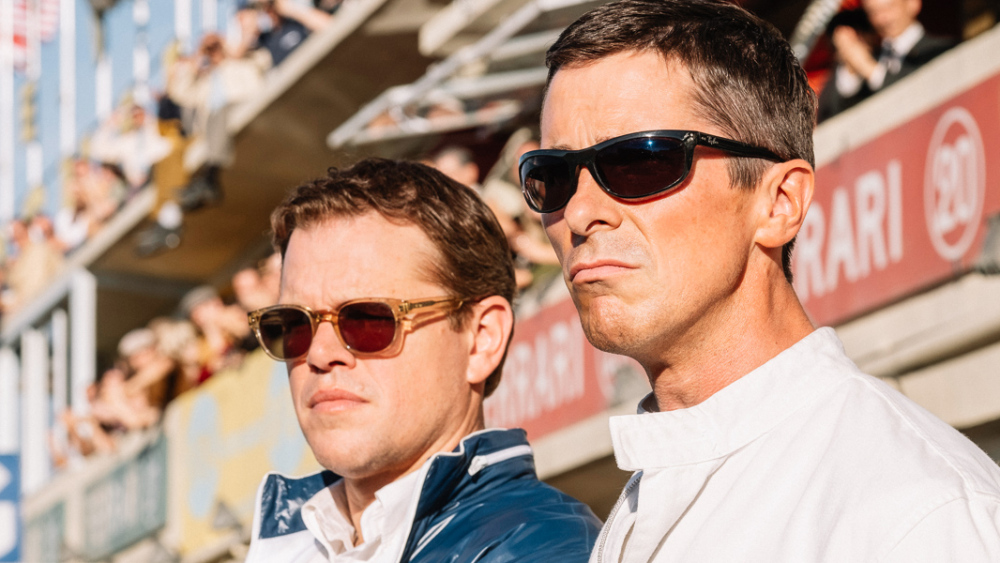
The 1960s set Ford v Ferrari might not sound appealing to anyone with limited knowledge of or interest in the world of motor racing. But, in the world of cinema, any story can work, regardless of its premise, thanks to the themes it examines. In the case of director James Mangold‘s latest, these universal themes cover friendship, humility and chasing one’s dreams.
Remember when Hollywood studios used to make mainstream films that did not have the studio-mandated, made-by-committee feel that surrounds most films these days? Films that relied on old-fashioned storytelling; veering away from visual bombast and marketing ploys and towards character, simplicity, proven formulas (in this case, the classic sports film) and charisma from its stars?
That’s what’s so refreshing about Ford v Ferrari, a film that looks like it’s all about slick, loud motors and the handsome marquee men who drive them; but is truly a story about an unlikely friendship that grew over the battle to build the ultimate racing car.
Matt Damon stars as Carroll Shelby, a championship driver whose tenacity on the racecourse causes damage to his ticker; causing him to retire from racing and go into car ownership. After a longstanding dispute, Ferrari founder Enzo Ferrari (Remo Girone) and Ford Motor Company magnate Henry Ford II (Tracy Letts) have decided to prove their mettle on the racing circuit. With Ford desperate to overtake Ferrari and stun the world with their cars, Lee Ioacca (Jon Bernthal) hires Carroll to oversee the attempt to win the 1966 run of the Le Mans endurance race. But doubt is cast over Carroll’s choice of driver, Ken Miles (Christian Bale), who seems to be entirely the wrong fit forthe Ford image.
Ken’s driving skills are without question, even as he juggles his domestic duties with his wife Mollie (Caitriona Balfe) and son Peter (Noah Jupe). But as Carroll and Ken face corporate setbacks and accidents, the duo also wrestle with their friendship, striving to prove themselves by pushing their car to its limits.
Based on a true story, no points will be rewarded to any reader for figuring out the conclusion, and the script by Jez Butterworth, John-Henry Butterworth and Jason Keller – who all have provided screenwriting efforts for biographical films like Black Mass, Fair Game, Get On Up and Machine Gun Preacher – follows the sports movieformula to a T. But director Mangold is no stranger to formula filmmaking himself, and thanks to his stellar work in Johnny Cash biopic, Walk the Line, he brings a strong focus on character, pacing, and capturing wonderful period details.
To some extent, the story can almost be seen as a behind-the-scenes look at the roots of filmmaking. When Shelby and his team are held up by the suits from Ford Motors (fronted by Letts, who’s only one moustache away from being a Hollywood producer), it feels rather like Mangold commenting on how he felt as he was trying to make The Wolverine. And, in doing so, Mangold injects plenty of humour into the situation, speaking from a place of familiarity.
As with many of the great sports movie, it’s not just about the competition but about the personalities on display. Ford v Ferrari benefits from colourful characters and a cast enthusiastic about bringing them to life. The supporting actors make the most out of their screen time, with Letts stealing the film with his commanding, yet secretly vulnerable presence and Balfe adding a refreshing unpredictability to what is essentially the doting wife role. It’s simply a delight to see Bernthal have more than five minutes of screen time in a mainstream film, and Lucas revels in a (what should be a) patented Lucas performance – smarmy, weaselly and leaving a trail of slime everywhere he goes.
As for the leads, they kick the film into gear and then some. Damon makes the most of his his genuine, down-to-earth charm, pulling off the slick cowboy-esque presence of Carroll with ease. The heart of the film however is Bale, who looks like he’s having the time of his life, removed from the self-serious or physically strenuous parts that he has chosen recently. In Ken, he is able to bounce from maverick grease monkey and loving father and husband. There’s convincing chemistry between Damon and Bale too, as their friendship goes from antagonism and bickering to mutual respect.
The character driven (pun intended) moments interspersed throughout the film rarely miss their mark, and they’re often best observed in scenes centred around Ken. First, during an overlong pit stop, when Ken has time to call his wife and son for a little chat, and again just after Miles survives an accidental collision. His son Peter has a brief, but affecting, talk with Phil Remington (a fantastic Ray McKinnon) about what just happened, and about his father’s survival.
We’ve come this far without much talk of the sport itself, but the racing scenes are spectacular. Well-realized and refreshingly almost free of CGI, they feature real vehicular stunts. With special credit going to the rip-roaring sound design, Mangold and his crew are able to create as much white-knuckle suspense from the practice sessions as the actual races. And considering the climax is the gruelling Le Mans, a 24 endurance race, that is really saying something.
Ford v Ferrari is proof that there’s life in the ol’ sport formula yet, with Mangold and crew under the hood with spanner in hand – and boy, do they kick this baby into gear.
![]()
![]()
![]()
![]()
![]()
FOUR STARS (OUT OF FIVE)
Ford v Ferrari is in cinemas now.
